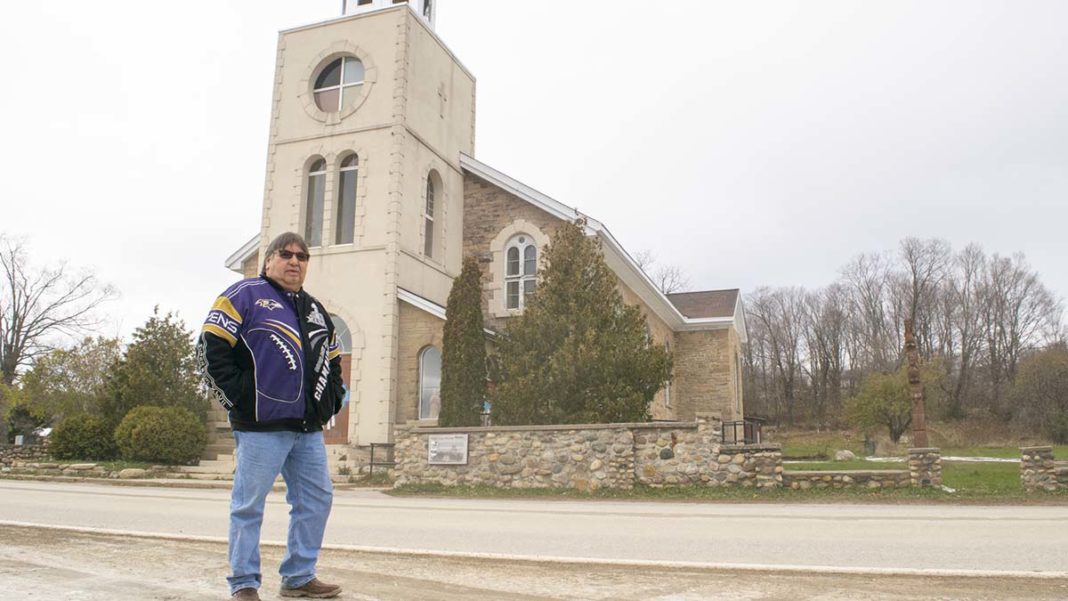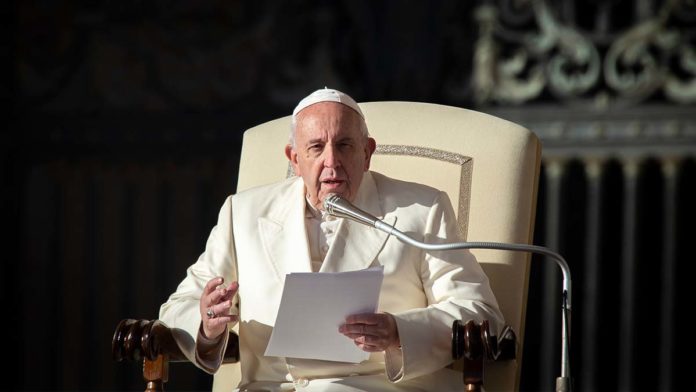EDITOR’S NOTE: The following story contains information about sexual abuse that took place in Wiikwemkoong during the mid-to-late 20th century. This information may be disturbing to those who have suffered from sexual abuse. Support is available 24/7 through the First Nations and Inuit Hope for Wellness Help Line at 1-855-242-3310 or the Manitoulin Family Resources crisis line at 1-800-465-6788.
by Warren Schlote
WIIKWEMKOONG—Pope Francis’ apology to Indigenous peoples in Canada was an incomplete gesture that missed the most important step toward healing, said Island elder and traditional healer Josh Eshkawkogan.
Mr. Eshkawkogan, whose Anishinaabe name is Mishkee Adzawin Enagadong (Medicine Life Keeper), is a knowledge keeper from Wiikwemkoong. He works with M’Chigeeng Health Centre and Noojmowin Teg Health Centre as a traditional healer and was watching how people reacted to the papal apology this past Monday.
He said the pope’s visit brought him mixed feelings, but also mixed feelings about how Indigenous peoples and Canadians could best move forward toward reconciliation.
“If you really wanted to change the things that are happening for First Nations people, you should give the power back to First Nations people to look after our own land, our own issues,” Mr. Eshkawkogan said.
Pope Francis delivered a public apology, on behalf of the Catholic Church, at a ceremony in Alberta July 25.
There have long been calls for such a reckoning among survivors of residential schools and family members of those who never returned home. Those calls reached a new intensity last year with the emergence of thousands of unmarked graves at former residential schools across Canada.
Some observers noted that Pope Francis’ apology never used the word genocide, a term that the Truth and Reconciliation Commission used to describe what happened at those schools. Another noted that he did not mention the sexual abuse that clergy members inflicted upon residential school students and community members.
Mr. Eshkawkogan has previously shared his own story of sexual abuse at the hands of Jesuit priests when he was a boy in Wiikwemkoong with The Expositor. Some of his healing work today is to help people recover from such traumas.
The apology’s sole focus on residential schools also missed the other ways the Catholic Church scarred many Indigenous peoples, such as through day schools and churches themselves, said Mr. Eshkawkogan.
“That’s the part that’s kind of upsetting, in regards for myself,” he said. “Even the Sixties Scoop. (The Catholic Church) had a big part in how things happened.”
Another missing link in the apology was no mention of, or rescinding of, the Doctrine of Discovery. This is a Church policy dating back to the 1400s that gave moral and legal justification to conquer foreign lands and enslave non-Christians in the process. This was rooted in a belief that Indigenous peoples were an inferior race.
The Conference of Catholic Bishops in Canada previously denounced this racist policy, but the Vatican has never taken such a move. In 2018, the Assembly of First Nations said the Canadian bishops’ statement wasn’t enough, and called for a papal denouncement because the Pope’s office started that policy.
Mr. Eshkawkogan said he has heard many apologies during his life, yet Indigenous peoples continue to face poorer health and social conditions, as a whole, compared to non-Indigenous Canadians.
He cited boil-water advisories (Neskantaga in Northern Ontario recently passed 10,000 days or more than 26 years without potable water), poor school conditions and inadequate housing as examples of the daily impacts of colonialism.
Mr. Eshkawkogan said the millions of dollars spent on the Pope’s tour might have been better used for correcting those systemic failures.
“We don’t need more empathy. We need some concrete direction for what (the government and the Church) are going to do to make amends for what they’ve done,” Mr. Eshkawkogan said.
He said there must be supports to help First Nations peoples return to their traditional customs, but also education for all people to learn the full impacts of generations of colonial interference.
“It was really disheartening for (the Pope) to not open the records in regards for what took place in the schools, and what’s taken place in other communities that were controlled by the Jesuits, like Wiiky for example. There was a lot of records taken out of that community from certain priests,” he said.
Mr. Eshkawkogan said some Indigenous people may have embraced the papal apology if they needed it for their own healing journey, but he said First Nations people should consider waiting to accept the apology before seeing meaningful change.
Mr. Eshkawkogan said he didn’t support the use of traditional customs as part of the apology, such as Pope Francis being given a ceremonial headdress to wear after making his speech.
“It’s really disheartening to see us First Nations people so willing to accept the apology and start sharing our gifts again to the same people that dishonoured our bundle, our ceremonies, our way of life … and made heathens out of us,” he said.
The pope did return a pair of child-sized moccasins, gifted to him at a ceremony in the Vatican earlier this year as a reminder of how children have been impacted by his church’s policies. He said he kept them over the past four months to remember the feeling of shame.
An apology on Canadian soil from the Pope is the 58th call to action from the Truth and Reconciliation Commission’s final report.




